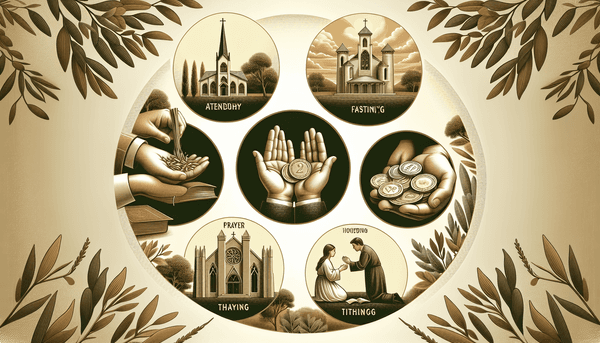The Practice of Fasting in Christianity
Fasting, as demonstrated by Jesus during His 40 days and nights in the wilderness (Matthew 4:2), is a practice steeped in spiritual significance. It serves as a means of drawing closer to God, seeking clarity, and reinforcing one's reliance on divine sustenance. The prophet Isaiah spoke of fasting as a way to 'loose the chains of injustice and untie the cords of the yoke, to set the oppressed free and break every yoke' (Isaiah 58:6), highlighting its potential for personal transformation and social action. While the customs of fasting have evolved, the essence remains the same—a deliberate abstinence that sharpens focus on God and fosters humility. Whether through traditional or contemporary forms of fasting, believers can integrate this discipline into their lives, following the examples set by figures like Daniel, who fasted for three weeks seeking God's wisdom (Daniel 10:2-3).
Tithing and Financial Contributions to the Church
Malachi 3:10 presents a call to faithfulness in giving: 'Bring the whole tithe into the storehouse, that there may be food in my house. Test me in this,' says the Lord Almighty, 'and see if I will not throw open the floodgates of heaven and pour out so much blessing that there will not be room enough to store it.' Tithing and offering are acts of worship that demonstrate trust in God's provision. They support the church's mission and enable the continuation of its work in the community and beyond. Giving is not merely a duty; it is a joyful response to God's generosity. As Jesus taught, 'For where your treasure is, there your heart will be also' (Matthew 6:21), indicating that our financial contributions reflect the priorities of our hearts and our commitment to God's kingdom.
Conclusion
Throughout this exploration of church attendance, fasting, prayer, tithing, and forgiveness, we are reminded of the multifaceted nature of living out one's faith. Each practice, imbued with its unique spiritual significance, contributes to the development of a robust and dynamic relationship with God. The consistent thread running through these practices is the personal connection with the Divine, a relationship that is both intimate and transformative. As believers navigate their spiritual journeys, it is the heartfelt pursuit of God's presence and the application of Biblical principles that cultivates a life of purpose and fulfillment. For further reflection on the transformative power of God's Word, consider our related exploration on biblical passages. May this article serve as a source of encouragement and guidance for those seeking to deepen their understanding and experience of the Christian faith.
FAQ
Q: How long did Jesus fast?
A: The Bible specifies that Jesus fasted for 40 days and 40 nights before being tempted by the devil in the wilderness, as described in Matthew 4:2.
Q: Is it a sin if I pray every day but cannot attend church?
A: The Bible emphasizes the importance of personal prayer and relationship with God. While Hebrews 10:25 encourages meeting together, prayer is a vital expression of faith, and one's inability to attend church does not constitute a sin.
Q: How can I be sure that God forgives my sins?
A: 1 John 1:9 assures us that when we confess our sins, God is faithful and just to forgive us and cleanse us from all unrighteousness, offering assurance of His forgiveness.
Q: Why do we give money to the church?
A: Giving to the church, as suggested in Malachi 3:10, is a way of supporting the Lord's work and trusting in His provision. It is an act of worship and a demonstration of faith in God's promise to bless and provide for His people.






